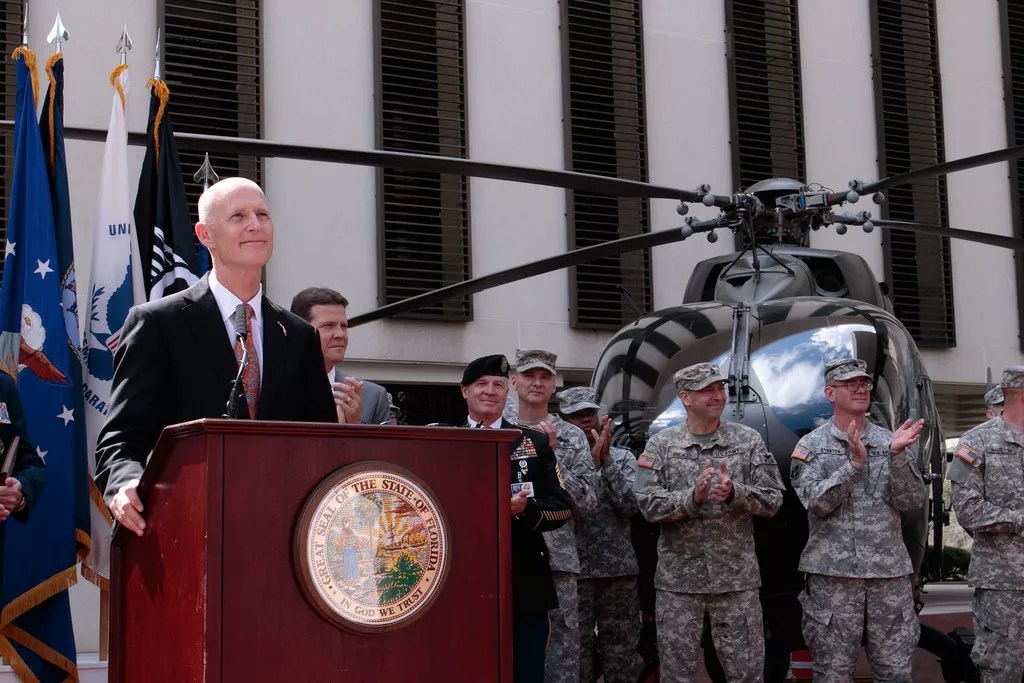
Office of Gov. Rick Scott

Audio By Carbonatix
Senator and poorly disguised Babadook Rick Scott today hopped onto Twitter and casually called for the U.S. military to invade Venezuela, a move that foreign policy experts on all but the most hawkish ends of the political spectrum have warned would be a massive bloodbath and spark a prolonged humanitarian crisis or civil war.
“There is only one option left to get aid to the people of Venezuela,” Scott tweeted. “It is something that no one is willing to talk about. It is becoming clear that we will have to consider the use of American military assets to deliver aid. Maduro and his thugs have left us no choice.”
Of course, a plan of this nature would constitute an outright violation of international law and would all but certainly spark a violent reaction from the Maduro government. Despite those painfully obvious concerns, Miami Congressman Mario Diaz-Balart almost immediately tweeted his support for an invasion.
The U.S. has always supported those suffering under oppression and extreme need and should protect humanitarian aid desperately needed in #Venezuela. I support @SenRickScott’s call today for taking necessary measures to get much-need food and medicine to the #Venezuelan people. https://t.co/mWN23NPrXe
— Mario Diaz-Balart (@MarioDB) April 11, 2019
Florida’s other U.S. senator, Marco Rubio, whom President Donald Trump has effectively deputized to run Latin American policy for the White House, was slightly more circumspect about Scott’s ideas but still sounded quite excited about the overall idea:
Ideal outcome in #Venezuela is peaceful restoration of democracy & constitutional order
But the U.S. can’t ignore the growing presence of #Russia military,the daily flights from #Iran & the violent ‘colectivo’ gangs the #FANB refuses to confronthttps://t.co/aCeTaAvDqN
— Marco Rubio (@marcorubio) April 11, 2019
Of course, this is all now happening because the Trump-Rubio group’s previous moves to oust Venezuelan strongman Nicolás Maduro have effectively failed. In January, Venezuelan National Assembly President Juan Guaidó declared himself president. With the backing of the United States (led by war criminal Elliott Abrams), Guaidó in February tried to ram a few American aid trucks across the Venezuela-Colombia border in a push that seemed designed to spark violence. Rubio, Scott, Diaz-Balart, and other U.S. officials blamed the Maduro regime for setting some of the aid trucks on fire – but the New York Times later reported that U.S. allies themselves actually caused the blaze by accident.
Foreign-policy experts and international groups warned the United States not to execute that plan. The United Nations and Red Cross, for example, warned the move would make it more difficult to get actual aid into the country. Analysts also warned that threats from the United States would back Maduro into a corner and force him to consolidate his grip on power. Those warnings have mostly come true: Maduro has increasingly cracked down on dissidents, arrested Guaidó’s chief of staff, and banned Guaidó from running for reelection. America and its allies had hoped Venezuelan military officials would flip on Maduro and effect a coup, but that has not occurred.
Now the country sits in a stalemate. America’s latest sanctions have cut the Venezuelan economy off from much of the world, and with each passing day, the sanctions are worsening an already horrid humanitarian crisis. Rubio, Scott, and Trump’s allies have all but admitted the so-called aid push in Venezuela is designed to drum up Republican votes in 2020 from Venezuelan and Latin American voters in South Florida.
Thread from yesterday about @marcorubio spreading doctored video it took about 3 minutes to debunk.. his tweet is still up and office hasn't responded to request for comment. https://t.co/1INHFwl9DP
— Danny Rivero (@TooMuchMe) April 3, 2019
With few options left to eke out some sort of policy win on Trump’s behalf, Scott and Diaz-Balart are now openly calling for a military invasion, in violation of international law. In February, an analyst with the Washington Office on Latin America, a D.C. think tank, warned that if the United States were to invade the South American nation, a war against Maduro’s forces would likely be short but could pave the way for a protracted battle with Chavista insurgents, because the country still contains 7 million or 8 million committed leftists. Destroying the Venezuelan military would also likely destroy any successor’s chance at governing the nation, because analysts warn that warring factions of gangs might overtake the country. A Washington Post opinion columnist in February warned an invasion would all but certainly turn Venezuela into the “Libya of the Caribbean.”
Even still, it’s unlikely that other Latin American allies in the region heed Scott’s call today – major players, such as Colombia and Brazil, ruled out the possibility of an invasion months ago. It remains to be seen whether the United States can browbeat those allies into jumping onboard.